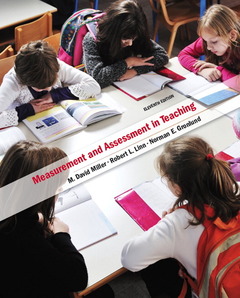Measurement and assessment in teaching (11st ed ) (11th Ed.)
Auteurs : Miller David, Miller M., Linn Robert, Gronlund Norman

For Classroom Assessment and Test and Measurement courses in Education Departments
For years, this outstanding, classic text has been the market leader for courses in Classroom Assessment and Tests and Measurement. In a presentation that assumes no previous knowledge of assessment or measurement, the text provides crystal clear step-by-step instruction on such topics as constructing test questions, aligning assessment with learning goals, and interpreting standardized tests. Providing readers with an understanding of the role of assessment in the instructional process, the book helps students learn how to construct effective test questions that are aligned with learning outcomes, evaluate published tests, and properly interpret scores of standardized tests. Measurement and Assessment in Teaching, eleventh edition, introduces the elements of measurement and assessment that are essential to good teaching, once again paving the way for future educators.
Highlights of the New Edition include:
- Objectives that clarify what should be learned from each chapter
- A discussion of the role of the Common Core Standards (Chapters 1, 3, and 4)
- Strategies to align tests with content standards (Chapter 4)
- Increased coverage on effective uses of formative assessment (Chapter 2)
- Presentation of Webb?s Depth of Knowledge Framework as a system for test planning (Chapter 3)
- Inclusion of multiple methods used to examine the fairness of tests for multiple populations (Chapter 4)
- Updated information on standardized achievement and aptitude tests (Chapters 16 and 17)
Measurement and Assessment in Teaching
By M. David Miller and Robert Linn
Part I: The Measurement and Assessment Process
Chapter 1: Educational Testing and Assessment: Context, Issues, and Trends
Chapter 2: The Role of Measurement and Assessment in Teaching
Chapter 3: Instructional Goals and Objectives: Foundation for Assessment
Chapter 4: Validity
Chapter 5: Reliability and Other Desired Characteristics
Part II: Classroom Tests and Assessments
Chapter 6: Planning Classroom Tests and Assessments
Chapter 7: Constructing Objective Test Items: Simple Forms
Chapter 8: Constructing Objective Test Items: Multiple Choice Forms
Chapter 9: Measuring Complex Achievement: The Interpretive Exercise
Chapter 10: Measuring Complex Achievement: Essay Questions
Chapter 11: Measuring Complex Achievement: Performance-Based Assessments
Chapter 12: Portfolios
Chapter 13: Assessment Procedures: Observational Techniques, Peer Appraisal, and Self-Report
Chapter 14: Assembling, Administering, and Appraising Classroom Tests and Assessments
Chapter 15: Grading and Reporting
Part III: Selecting and Using Published Tests
Chapter 16: Achievement Tests
Chapter 17: Aptitude Tests
Chapter 18: Test Selection, Administration, and Use
Chapter 19: Interpreting Test Scores and Norms
Appendix A: Taxonomy of Educational Objectives
Appendix B: Content Standards
Appendix C: Elementary Statistics
Appendix D: Relating Assessment Procedures to Instructional Objectives
Appendix E: Selected Published Tests
Appendix F: Test Publishers
Appendix G: Standards for Teacher Competence in Educational Assessment of Students
Appendix H: Professional Journals for Locating Measurement and Assessment Articles
M. David Miller has been working in the field of assessment and evaluation for more than 25 years. He is a Professor in Research Methods and Evaluation at the University of Florida. He is also the Director of the Collaborative Assessment and Program Evaluation Services, which conducts evaluation and assessments of public school programs and NSF grants at the UF. As part of this work, he is also the Director of the University of Florida’s Quality Enhancement Plan, which is looking at ways to prepare undergraduates to compete in an international environment. He has also been a co-Director of a state K-12 assessment program and was the data analyst for the Second International Mathematics Study.
Robert L. Linn is a Distinguished Professor emeritus of Education at the University of Colorado at Boulder. He is a member of the National Academy of Education and Lifetime National associate of the National Academies. He is a former President of the Division of Evaluation and Measurement of the American Psychological Association, former President of the National Council on Measurement in Education, former Vice President of the American Educational Research Association for the Division of Measurement and Research methodology, and former President of the American Educational Research Association. He is widely published in educational measurement and has received several awards, including the ETS Award for Distinguished Service to Measurement, the E. L. Thorndike Award, the E. F. Lindquist Award, the National Council on Measurement in Education Career Award, and the American Educational Research Association Award for Distinguished Contributions to Educational Research. |
Significant coverage of the Standards Movement, including Common Core Standards
- Chapter 1 presents new ways of conceptualizing the role of tests and assessments. Chapters 3 and 4 include more detailed discussion, including a focus on the development of Common Core Standards through a multi-state consortia.
Detailed, straightforward guidelines for how to construct test items with many concrete examples
- Step-by-step Checklists and Guidelines are provided to help students apply content. These provide quick reference guides for how to write items, provide feedback to students, and more.
Specific strategies for meeting students' individual needs
- Each chapter profiles a student and includes a short introductory story on the child, IEP goals and objectives for that student, and tips for adapting/modifying instruction.
Coverage of both formative and summative assessment and of all practical aspects of classroom assessment teachers need
- Including informal assessment procedures like observation (Chapter 13), methods for constructing objective test items(Chapters 7 and 8), measuring complex achievement (Chapters 9-11), assessing portfolios (Chapter 12), grading (Chapter 15), and evaluating published tests (Chapters 16-19).
Date de parution : 08-2012
Ouvrage de 576 p.
19.2x23.8 cm
Disponible chez l'éditeur (délai d'approvisionnement : 12 jours).
Prix indicatif 194,51 €
Ajouter au panier


